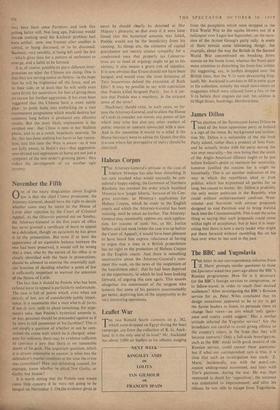November the Fifth
ONE of the many illogicalities about English law is that the chief Crown prosecutor, the Attorney-General, should have the right to decide whether cases may be taken to the House of Lords after rejection by the Court of Criminal Appeal. As the Observer pointed out on Sunday, the Attorney-General in his five• years of office has never granted a certificate of leave to appeal to a defendant, though on occasions he has given it to the prosecution. But even if at least the appearance of an equitable balance between the two had been preserved, it would still be wrong that a man, who by the nature of his oflice is so closely identified with the State in prosecutions, should be allowed to exercise the essentially judi- cial function of deciding whether a point of law is sufficiently important to warrant the attention of the House of Lords.
The fact that it should be Podola who has been refused leave to appeal is particularly unfortunate. The case is full. of points which, even when not strictly of law, are of considerable public impor- tance. Is it reasonable that a man who is de facto, if not de lure, unfit to plead (assuming, for argu- ment's sake. that Podola's hysterical amnesia is, or was, genuine) should be proceeded against as if he were in full possession of his faculties? This is not simply a question of whether or not he com- mitted the crime with which he is charged; what- ever his unfitness, there may be evidence sufficient D convince a jury that there is no reasonable doubt of his guilt. The important question, which it is almost impossible to answer, is what was the defendant's mental condition at the time the crime was committed? How can defending counsel, for example, know whether to plead Not Guilty, or Guilty but Insane?
It is worth noting that the Podola case would cause little concern if he were not going to be kanged on November 5. Ort.the evidence given in court he should clearly be detained at Her Majesty's pleasure; so that even if it were later found that the hysterical amnesia was faked, Podola would not be the beneficiary from his cunning. As things are, the existence of capital punishment not merely creates sympathy for a , condemned man that properly (as Conserva- tives are so fond of arguing) ought to go to his victims; it also means a grave risk of injustice. It is now obvious that Evans should not haye been hanged:, and would even the most ferocious of Tory housewives defend the execution of Ruth Ellis? It may be possible to say with conviction that Podola killed Sergearit Purdy : but is it cer- tain that Podola was a murderer, in the strictest sense of the term?
Machinery should exist, in such cases, to by- pass the Attorney-General, and to allow the House of Lords to consider not merely any Points of law which may arise but also any other matters of public interest or concern connected with a case. And in the meantime it would be a relief if the 'Home Secretary were to advise the Queen that this is a case where her prerogative of mercy should be exercised.










































 Previous page
Previous page